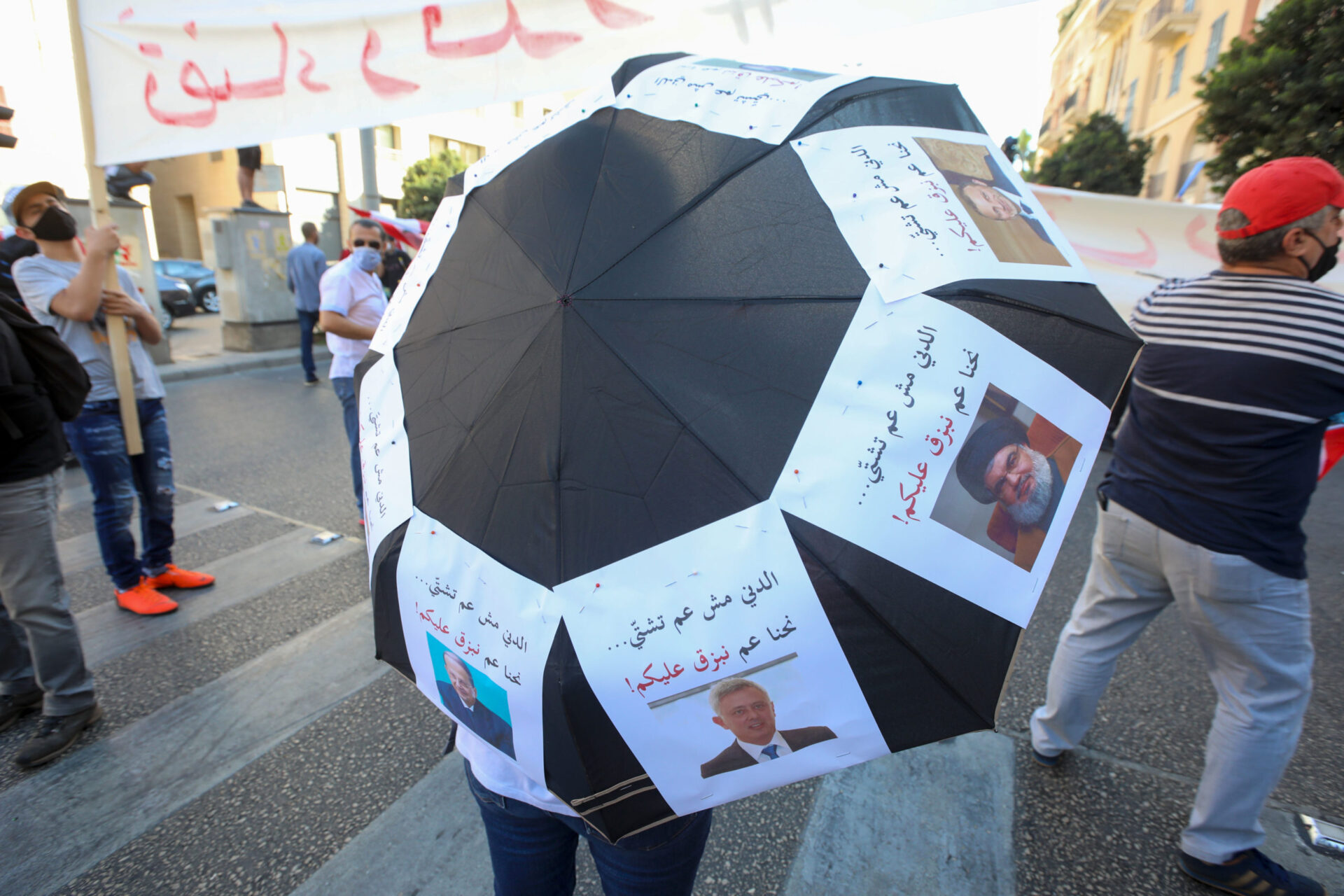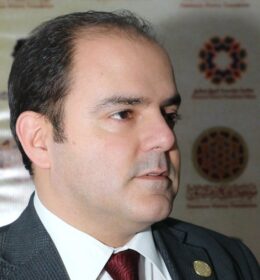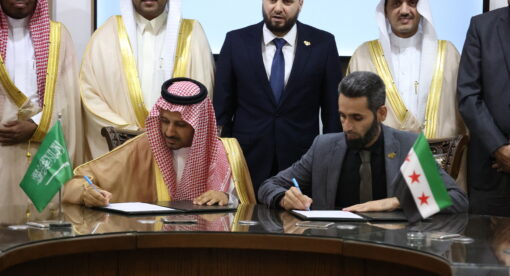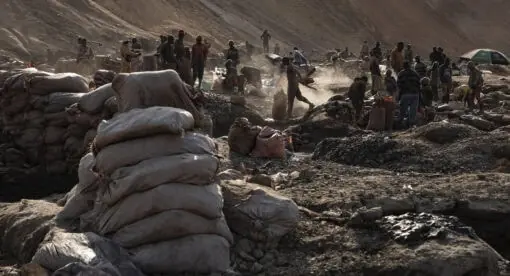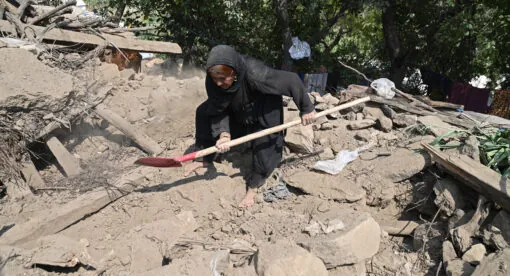Lebanese President Michel Aoun is seeking to extend his mandate, either through another term or by handing the presidency to his son-in-law and political heir, Gibran Basil. But the 86-year-old Aoun and wildly unpopular Basil have a steep hill to climb, including garnering the approval of a splintered parliament and an increasingly shaky alliance with Hezbollah.
Five years ago, the argument within the Hezbollah-led March 8 Coalition was that Michel Aoun should become president — due mainly to his old age. Aoun was 81, and many feared that he might not live enough to see the next elections in 2022. On that argument, presidential hopeful Suleiman Frangieh was talked out of the race by Hezbollah Secretary-General Hassan Nasrallah. He was told that he could wait a bit longer while the aging Aoun ought to be accommodated before he dies.

Neither Nasrallah nor Frangieh ever imagined that not only would Aoun live to see the end of his term but also seek an extension of his mandate. By the time his term expires in October 2022, Aoun will be 87. That has not prevented him from peddling the idea of a term extension unless his son-in-law and political heir, Gibran Basil, is brought in to replace him. For months that idea has been discussed behind closed doors, only to come out to the open earlier this year through MP Maroun Aoun, a relative of the president and member of his Free Patriotic Movement (FPM). It has also since surfaced in a number of articles in the daily newspaper al-Akhbar, a media outlet closely affiliated with Hezbollah, describing it as a “serious option.”
If Aoun and Basil go ahead with this scheme, it would undoubtedly ruin what remains of the president’s already damaged reputation, plagued with massive economic collapse, a financial meltdown, and the Beirut port explosion of August 2020 that destroyed half the city and killed over 200 civilians. None of those responsible for that explosion have been brought to justice, although formal accusations have been filed against Prime Minister Hassan Diab and two of his ministers, all accused of criminal negligence leading up to the blast. Instead of complying with the court, Diab and his top associates managed to successfully oust the judge handling the case.
In October 2019, young people took to the streets, demanding change and a rehaul of the entire political system, chanting for the ouster of Aoun and other top leaders. They also targeted other heavyweights in the Lebanese scene, like Nasrallah, former Prime Minister Saad al-Hariri, and Parliament Speaker Nabih Berri, but the outburst against Aoun was the most visible because he remained perched atop the presidential seat at Baabda Palace. The demonstrators were met with guns, brawlers, and tear gas sent to the streets by Aoun’s police state. They would undoubtedly take to the streets again, however, if Aoun announces a bid at staying in power beyond October 2022.
Last month, Aoun added to public anger by getting his entire staff, family, and loyalists vaccinated against COVID-19 — before the vaccine reached the majority of high-risk Lebanese citizens, such as the elderly and frontline medical workers. Aoun’s age and office both qualify him for the vaccine, but his decision to extend the mandate to his team struck a raw nerve throughout the country.
If Aoun extends his mandate, it will be a key crisis for the Biden administration in the Middle East. Lebanon is not a high priority for U.S. foreign policy, but Iran is — and Iran controls the entire Lebanese political system via Hezbollah. Aoun has been a staunch Hezbollah ally for the past 15 years, and an extension of his presidency, either via himself or by handing the presidency to Basil, would be another blow to curbing Tehran’s influence in the country and by extension the region.
Other Maronite Christians have considered challenging Aoun for the presidency, but Hezbollah’s control over most seats in Parliament — and the implied threat of its arsenal of weapons — means it is unlikely that any true opposition figure would be allowed to emerge without first entering into Hezbollah’s orbit.
Christian Opposition
The decision to extend Aoun’s mandate would be contested by leading Christian figures who are eyeing the presidency for themselves, like Frangieh, the Marada Movement leader, and Lebanese Forces leader Samir Geagea.

Frangieh believes that the presidency — a post once occupied by his grandfather, also named Suleiman Frangieh, at the start of Lebanon’s civil war in 1975 — should have been his. He waited five years for Aoun’s term to end and is reportedly unwilling to wait any longer, either for Aoun’s sake or for Basil’s.
Frangieh has always been a staunch Hezbollah ally (unlike Aoun, who improved relations with the group 15 years ago in an effort to secure the presidency). Hezbollah has supported Frangieh with the objective of securing Christian support for the preservation of its militia and, after 2012, for the group’s involvement in the Syrian civil war.
Frangieh’s party is rather small, linked mostly to his fiefdom in Zghorta, and he has none of the broader appeal that Aoun and Geagea enjoy in the wider Christian community. It is not entirely clear in what direction the Christians would vote if a true presidential election were to happen, but if forced to choose between Aoun and Frangieh, they would probably find the latter as the lesser of two evils since he comes with none of the luggage on Aoun’s back. Frangieh is not associated with any of the failures or the corruption of the present administration and has no son-in-law waiting in the backroom to succeed him.
His main problem is that one of his trusted aides, ex-minister Yusuf Finianos, was recently sanctioned by the United States for being a Hezbollah frontman. Although the Biden administration has not yet pursued the policy of targeted sanctions in Lebanon, it might change course and sanction individuals who work with the Iran-backed party, facilitating its financial and political dealings. Those sanctions might apply to other members of Frangieh’s team, and so would any trappings from the Caesar Act, given Frangieh’s strong relations with Damascus. Such ramifications would undoubtedly put him in a tough position internationally should he become president.
Geagea has been Aoun’s traditional opponent in Christian politics since the days of the civil war. They fought each other in the late 1980s, with Aoun launching what has since been coined Harb al-Ilghaa (The War of Cancelation) against Geagea, bombing entire neighborhoods of East Beirut which until then had been spared from most of the fighting. After the war ended, Aoun was exiled in 1991, and Geagea was arrested and imprisoned in 1994. When Syrian troops were evacuated from Lebanon in April 2005, both men returned to the helm of Christian politics and were still at daggers-end.
Aoun teamed up with Hezbollah, realizing that given their military strength and demographic dominance, they were the only ones capable of making him president, a dream that he had harbored throughout his career. Geagea sided with the anti-Hezbollah camp, known as the March 14 Coalition, and was allied to then-Prime Minister Fouad al-Siniora and his successor, al-Hariri. That positioning has endeared him to many Christians and Sunnis, but the support of those communities would not be enough to make Geagea president. He, too, would need support from Hezbollah — support that will simply never come if he continues to call for their disarmament and criticize Iran’s tutelage in Lebanon.
Obstacles for Aoun
Extending Aoun’s term requires a two-thirds vote in parliament and approval of the prime minister. The Aounists currently control 29 out of 128 seats in the Chamber of Deputies. Their allies, Hezbollah and the Amal Movement, command 12 and 17 seats respectively, making them the largest bloc in Parliament. In theory, that brings the total number of MPs who would vote for Aoun to 58 — well short of the 86 they would need. Moreover, tensions between Basil and Berri, the parliament speaker and the Amal Movement’s leader, make it unlikely that the party would vote in favor of an extension.

Making matters more complicated for Aoun is the demand for early parliamentary elections, which major parties across the political spectrum support. Those elections had been promised by al-Hariri in 2019 and reaffirmed as an objective by his successor, Diab.
Hariri, Nasrallah, and Berri would not mind new elections, confident that they would maintain more or less the same number of seats for their parties. Al-Hariri’s share is currently 21, down from 33 in 2009 and 36 in 2005. Due to his increased popularity in Sunni circles (for lack of better alternative and in light of rising Shiite hegemony), he would likely maintain his current hold or increase it slightly. Nasrallah’s share has been relatively stable: 14 in 2005, 14 in 2009, and 12 in 2018. So has that of Berri, with 14 in 2005, 13 in 2009, and 17 in 2018.
Basil abhors the idea of early elections. His tarnished reputation — mostly self-inflicted — makes it unlikely that his Free Patriotic Movement would maintain its current 29 seats in new elections. The FPM president was the subject of ridicule and public anger in October 2019 when demonstrators accused him of corruption, nepotism, and misuse of public office. He is thus pushing for an extension of the current parliament’s tenure until after a new president is sworn into office as a way to secure 29 seats for Aoun’s mandate extension — or for his own presidential bid.
Other Christian parties are in favor of early elections, like Suleiman Frangieh’s Marada Movement, the Phalange Party of ex-President Amin Gemayel, and Geagea’s Lebanese Forces. These parties represent large swaths of the political spectrum of the Christian community, covering radicals, moderates, and those in between. The parties all believe that they have a high chance at expanding their share in parliament, given the Free Patriotic Movement’s diminishing popularity within the Christian community. Currently the Phalange has 3 seats while Marada has zero.
Eight parliamentary seats were made vacant in the walkout, representing parts of Greater Beirut, al-Shouf, Northern Metn, Keserwan, and Aley. A ninth seat (also Christian) was just made vacant by the death of aging MP Michel al-Murr this February. According to the Lebanese Constitution, by-elections for the eight vacant seats ought to happen no later than Oct. 13, 2020. Basil, fearing that by-elections would have led to victories for his Christian rivals, prevented the vote by nudging the Interior Ministry for postponement, claiming that the government did not have the budget for the elections on such short notice.

But with the presidential race approaching, Basil has begun pushing for by-elections to test whether he is still capable of drumming up support from Christian voters. If the Free Patriotic Movement could pick up an additional seat, it would bode well for his plans; if not, then no harm would be done since those seats presently are already held by his opponents. A preliminary date of June 6 has been set for those elections, and the Free Patriotic Movement is preparing new fresh faces not associated with any of the corruption or mistakes of the past to stand for election.
Even if Aoun and Basil get the votes to extend their political ambitions, the effort would be scuttled without support of the prime minister. That job is currently in the hands of Hasan Diab, an Aoun ally, but only as a caretaker. Diab resigned after the Beirut explosion but his successor, al-Hariri, has thus far failed to form a government.
The reasons for that failure are many, and most involve the Free Patriotic Movement, which has demanded cabinet posts traditionally claimed by al-Hariri’s Future Movement, such as the portfolio of the interior, which has always gone to a Sunni Muslim. Basil also has made claims to strategic portfolios including justice, energy, and public works, and he has demanded the right to unilaterally name all Christian ministers and receive a blocking majority in government.
If al-Hariri manages to form a government, it would be the last of Aoun’s constitutional term, and the new government would be charged with supervising the next presidential election. If no consensus is reached, al-Hariri’s government will take over presidential powers at the end of Aoun’s term until a new president is chosen. Al-Hariri would undoubtedly refuse to extend Aoun’s mandate or entertain a presidential bid from Basil.
Shaky Hezbollah Support
In late December, Basil and Nasrallah agreed to revisit the Mar Mikhail Agreement of February 2006, which cemented the Hezbollah-Free Patriotic movement alliance and eventually brought his father-in-law to the presidency. Basil wanted amendments that would apply to him, hoping to secure Hezbollah’s support for his candidacy when his father-in-law’s term ends in October 2022.
Nasrallah had originally been reluctant to commit, considering Basil an unreliable ally and having a much more palatable option in the form of Frangieh and his Marada Movement. Hezbollah had been forced to deal with Basil because of his influence on Aoun, who had made him foreign minister and private adviser at Baabda Palace, but the all-Shiite party never forgave Basil for reaching out to al-Hariri behind their backs during the parliamentary elections of 2018 or for equating the Syrian presence in the country with the French occupation of the 1920s. More recently, Basil’s comments showing support for normalizing relations with Israel have raised eyebrows in Hezbollah circles.
But Hezbollah was forced to deal with Basil yet again after he was slapped with U.S. sanctions in November 2020. He played the victim, appealing to his constituency and to the Shiites, saying that those sanctions were punishment for his commitment to Hezbollah. Instead of breaking the fragile pact between Basil and Hezbollah, the U.S. sanctions only pushed him further into Nasrallah’s lap. Nasrallah agreed to form a joint committee to meet in January to revisit the Mar Mikhail Agreement, but that meeting was delayed, and every time the Free Patriotic Movement has asked for the committee to convene, Hezbollah has found an excuse for postponement..
Basil is upset with Hezbollah for many reasons, but none, yet, have surfaced in public. In addition to the continued postponement of the Mar Mikhail Agreement meeting, he feels abandoned by Hezbollah, which refused to support him in his feud with al-Hariri, who persistently refuses to make him minister or give him the right to name nine Christian ministers in the new government. Not only that, but Hezbollah MPs also endorsed al-Hariri for premier in October, despite the no-confidence vote given by Basil and the Free Patriotic Movement. And when Aoun and Basil pushed for the removal of Riad Salameh, the governor of the Central Bank, Hezbollah gave him nothing but lip service in order not to offend their ally Berri, who wanted Salameh to stay at his job.
But more pressing to Basil than those concerns are his presidential ambitions. If he doesn’t get support from Hezbollah, then he will never reach Baabda Palace, a difficult reality that Aoun accepted when returning to Lebanon 15 years ago.
Conclusion
It is not strange for Aoun to seek an extension of his mandate and to cling onto office despite his old age and the failures of his administration; he did much the same thing as prime minister in 1989 when he refused to leave Baabda Palace at the end of the civil war. He had to be ejected by the Syrian Army, and he spent most of his exile insisting that he was the legitimate prime minister of Lebanon.
Yet Aoun seems to have missed lessons from the recent Arab Spring, where aging autocrats were forced out of office because they toyed with reelection. Algerian president Abdulaziz Bouteflika was 82 when he announced his bid for election in 2019, only to be toppled by popular protests. Hosni Mubarak of Egypt was 83 in 2011 when he sought reelection, but he too was toppled by popular protests. It remains to be seen whether Aoun will end up like his two octogenarian counterparts or whether Hezbollah support will save him — yet again — from an ugly political end.
Hezbollah has yet to comment on Aoun’s mandate extension.The pro-Hezbollah daily al-Akhbar has run positive editorials, but those are neither decisive nor party policy. If forced to choose between Aoun and Basil, Hezbollah would probably go for the former, accepting an extended presidency where Basil continues to call the shots instead of a full-fledged Basil presidency. But that too would depend on Frangieh and whether he will stick to his presidential bid or compromise it, yet again, for the sake of his allies. Currently, that seems highly unlikely.
In the end the fate of the presidency is not just about the intra-Christian balance of power in the country. It is also linked to the future of the largest Christian faction, whose fate determines Hezbollah’s continued ability to dominate the country – at a time of unprecedented public anger towards political elites across the terribly divided political landscape.
Dr. Sami Moubayed is a Syrian analyst and historian, and author of “Under the Black Flag: At the Frontiers of the New Jihad” (IB Tauris, 2015). Dr. Moubayed is a frequent contributor to Newlines Institute. Moubayed earned his PhD in Middle East Studies from the University of Exeter, specializing in the founding era of the Syrian state. He tweets at @smoubayed
The views expressed in this article are those of the author and not an official policy or position of the Newlines Institute.

